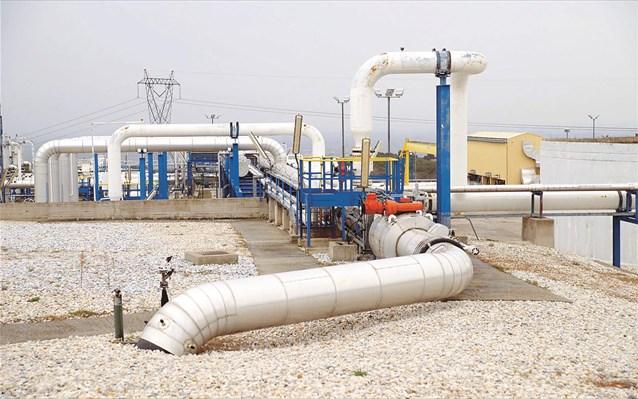Photos: Kathimerini, Imerisia
Victoria Mindova
Over the past 24 hours, the developments related to the privatization of the Greek gas company DEPA have been in the media spotlight since Russia's Gazprom has withdrawn its offer to buy the company. The news had caused commotion and unrest in the country as a result of which the Athens Stock Exchange closed on Monday with a loss of 4.7%. The two main questions that we have asked ourselves are, "Why have the Russians withdrawn their offer?" and "What will happen with the Greek gas company from this point onwards?"
"There are problems that are above and beyond us," Prime Minister Antonis Samaras said in connection with the failure of the deal, apparently unpleasantly surprised by the situation.
"There are problems that are above and beyond us," Prime Minister Antonis Samaras said in connection with the failure of the deal, apparently unpleasantly surprised by the situation. "The reasons for the failure should be sought in Brussels and Moscow," the Privatization Agency said straight out.
Deputy Minister of Energy Makis Papageorgiou also answered the first question. "Highly placed sources from Moscow reported that their contacts with Brussels have made it clear that the European Commission is going to set stricter conditions and rules as regards the implementation of the deal," reports Imerisia.
The natural conclusion that we can draw is that Brussels has given a clear sign to Moscow that if it wins  the tender for DEPA’s privatization, a series of difficulties as regards the fulfilment of the investment plan will follow. Although the European Commission had firmly denied on Monday any involvement in the Greek privatization process, Kathimerini, which refers to sources from the local energy sector, confirms this scenario too.
the tender for DEPA’s privatization, a series of difficulties as regards the fulfilment of the investment plan will follow. Although the European Commission had firmly denied on Monday any involvement in the Greek privatization process, Kathimerini, which refers to sources from the local energy sector, confirms this scenario too.
The publication reports that Brussels has sent a clear message to Gazprom that the approval of DEPA’s purchase will take a long time or that it will not be approved at all because of the dominant role of the Russian company in the European market.
The projects
Europe’s plans to diversify its gas supplies in the coming years have been clearly defined for a long time now. Due to the failure of the Russian-Greek deal, Brussels is scoring a point in the fight between the EU and Russia for dominance in the energy market.
Europe’s great hope of alternative natural gas supplies is related to the deposits in the Caspian Sea near Azerbaijan, which, by 2018, will annually secure 10 billion cubic metres of natural gas from the Shah Deniz-2 field to Europe.
The route preferred by the investors should be clear by the end of the month in order for the Azeri gas supplies to the continent to begin. The main pipe will cross Turkey with the TANAP (Trans-Anatolia-Pipeline) pipeline and from there, it can continue to Europe through the "Nabucco -West" pipeline, crossing Bulgaria, Romania, Hungary and Austria or through the TAP (Trans-Adriatic Pipeline), passing through Greece, Albania and Italy to Switzerland.
The catch
After Gazprom has been pushed away from the Greek market, DEPA has remained without a new candidate owner. The route of the Azeri gas to Europe via Greece, however, is open. It turns out that Socar is the only contender for the purchase of DESFA, the gas transmission system operator in Greece. Such a development could be crucial for the approval of the Trans-Adriatic Pipeline to its alternative, which is Nabucco, but there is a catch. Early indications show that the amount offered by Socar for DESFA is not enough to meet the desired market price.
At the same time, Greece is bound by its international lenders as regards the specific privatization revenues under the Memorandum of financial support. DEPA’s sale was planned to take place this year and it was expected that it would bring to the state coffers additional revenue to the amount of 1 – 1.5 billion euro. The postponement of the sale will open a new hole in the government revenues and the state will probably have to take additional steps to meet its obligations under the assistance contract.
The Russian alternative
Gazprom’s Deputy CEO Alexander Medvedev announced that the price of the natural gas sold in Greece would be 30% higher in comparison with its average price in the rest of the European countries.
Gazprom’s Deputy CEO Alexander Medvedev announced that the price of the natural gas sold in Greece would be 30% higher in comparison with its average price in the rest of the European countries as reported by iefimerida.gr. The edition refers to the information presented by Medvedev at a press conference in Moscow this week.
According to it, the average price of Russian natural gas to European countries is $ 380 per 1,000 cubic metres. It is expected that the price of the same quantity of natural gas to Greece will vary between $ 480 - 540 dollars, which is $ 100 - 160 higher than the average value per 1,000 cubic metres of gas in Europe. Since Greece imports about 2.5 billion cubic metres of natural gas annually, it is believed that the loss of this deal to the Greek consumers will be about 250 million euro per year.
One of the reasons for Gazprom to offer the highest bid in the tender for DEPA’s privatization is the high selling price of natural gas through which the Russian company would return its investment in a very short time. The sale of DEPA has been frozen for the time being but according to unofficial information, it may be postponed for 2014 when a new auction will be scheduled.